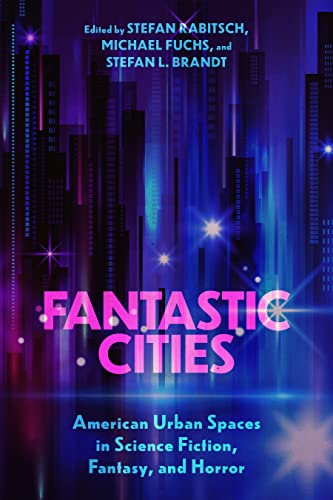Subscribe to Read
Sign up today to enjoy a complimentary trial and begin exploring the world of books! You have the freedom to cancel at your convenience.
Fantastic Cities: American Urban Spaces in Science Fiction, Fantasy, and Horror
| Title | Fantastic Cities: American Urban Spaces in Science Fiction, Fantasy, and Horror |
| Writer | |
| Date | 2024-10-13 06:20:59 |
| Type | |
| Link | Listen Read |
Desciption
Contributions by Carl Abbott, Jacob Babb, Marleen S. Barr, Michael Fuchs, John Glover, Stephen Joyce, Sarah Lahm, James McAdams, Cynthia J. Miller, Fernando Gabriel Pagnoni Berns, Chris Pak, María Isabel Pérez Ramos, Stefan Rabitsch, J. Jesse Ramírez, A. Bowdoin Van Riper, Andrew Wasserman, Jeffrey Andrew Weinstock, and Robert Yeates Metropolis, Gotham City, Mega-City One, Panem’s Capitol, the Sprawl, Caprica City—American (and Americanized) urban environments have always been a part of the fantastic imagination. Fantastic Cities: American Urban Spaces in Science Fiction, Fantasy, and Horror focuses on the American city as a fantastic geography constrained neither by media nor rigid genre boundaries. Fantastic Cities builds on a mix of theoretical and methodological tools that are drawn from criticism of the fantastic, media studies, cultural studies, American studies, and urban studies. Contributors explore cultural media across many platforms such as Christopher Nolan’s Dark Knight Trilogy, the Arkham Asylum video games, the 1935 movie serial The Phantom Empire, Kim Stanley Robinson’s fiction, Colson Whitehead’s novel Zone One, the vampire films Only Lovers Left Alive and A Girl Walks Home Alone at Night, Paolo Bacigalupi’s novel The Water Knife, some of Kenny Scharf’s videos, and Samuel Delany’s classic Dhalgren. Together, the contributions in Fantastic Cities demonstrate that the fantastic is able to “real-ize” that which is normally confined to the abstract, metaphorical, and/or subjective. Consequently, both utopian aspirations for and dystopian anxieties about the American city become literalized in the fantastic city. Read more
Review
Editorial Reviews Review Fantastic Cities is overall a superb collection of essays that will resonate with scholars studying sf, genre fiction, and ecocriticism in particular. -- Hogan Schaak ― ExtrapolationOverall, however, this is a remarkably strong collection, due in no small part to its accessibility. The essays all demonstrate clear writing that never becomes bogged down in pretentious, obfuscating jargon. . . . In short, clear and insightful historically informed essays form the core of this fascinating book. -- Jeremy Withers ― Science Fiction StudiesFantastic Cities provides a comprehensive survey of ‘the city’ as it is represented in fantastic fiction across centuries, continents, cultures, and genres. The authors featured in this anthology successfully draw together a range of humanistic and social science critical frameworks to make sense of the fantastic city as a powerful way to express our collective hopes and fears about science, technology, society, and futurity. -- Lisa Yaszek, coeditor of Literary Afrofuturism in the Twenty-First CenturyThis collection is the first to critically engage with how cities are represented in fantasy, horror, and science fiction. The essays are intriguing and will serves as a starting point for further research and analysis of fantastic urban landscapes. -- P. J. Kurtz ― CHOICE About the Author Stefan Rabitsch is associate professor of American studies at the University of Oslo, Norway. He is author of “Star Trek” and the British Age of Sail: The Maritime Influence Throughout the Series and Films and coeditor of Fantastic Cities: American Urban Spaces in Science Fiction, Fantasy, and Horror; Set Phasers to Teach! “Star Trek” in Research and Teaching; and The Routledge Handbook of “Star Trek.”Stefan L. Brandt is professor of American studies at the University of Graz in Austria. He is author of The Culture of Corporeality: Aesthetic Experience and the Embodiment of America, 1945–1960 and coeditor of Ecomasculinities: Negotiating Male Gender Identity in U.S. Fiction; Space Oddities: Difference and Identity in the American City; Making National Bodies: Cultural Identity and the Politics of the Body in (Post-)Revolutionary America; and Transnational American Studies.Michael Fuchs is coeditor of Intermedia Games―Games Inter Media: Video Games and Intermediality; ConFiguring America: Iconic Figures, Visuality, and the American Identity; Placing America: American Culture and Its Spaces; and Landscapes of Postmodernity: Concepts and Paradigms of Critical Theory.




